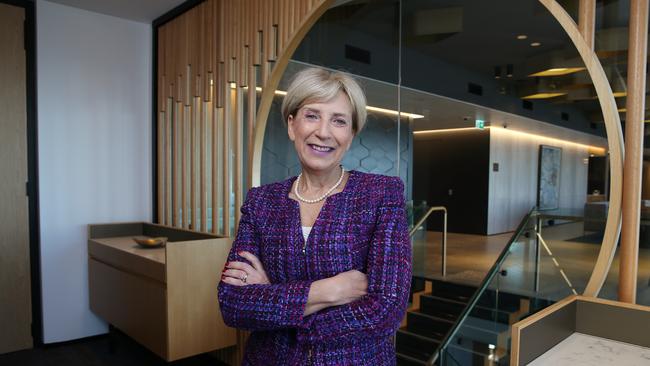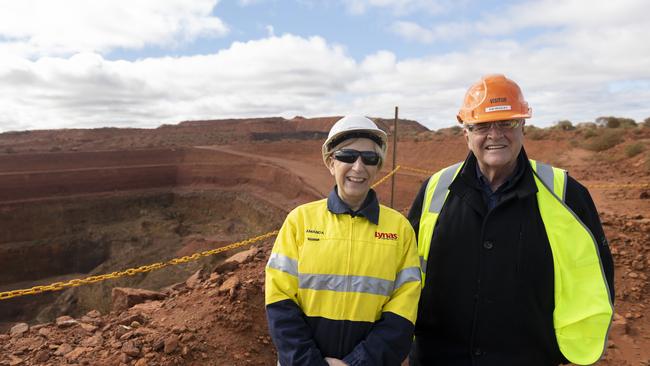Time to rethink our supply chains, says Lynas boss Amanda Lacaze

If we are to build a modern manufacturing capability for the future-facing and green industries that we want, then very secure supply chains need to be put in place. To achieve that in Australia, she says state and federal governments do not have to pick winners, but they do need to create the right environment for business to play a meaningful part in the changing global supply chain. The market simply cannot deliver on its own.
“Modern manufacturing capability is essential for all the green technologies but it is particularly important for the recovery from Covid because every country wants its economy to be running well,” she says.
On Tuesday this week West Australian governor Kim Beazley flew across to Lynas’s Mount Weld mine near Laverton, 730km east-northeast of Perth. He was joined by Lacaze to host a visit from a senior European Union delegation with representatives from nine member states.
From rare earths magnets for renewables and machinery to lithium and cobalt in batteries, the need to understand the critical mineral supply chain is now a priority for every country. Interest is twofold: the security of the supply chain outside China and the environmental sustainability of the chain, from mine to magnet.
“We were able to showcase to a number of EU delegates what a vital minerals province Australia is and how important it will be for the security of global supplies in the next generation of industrial technologies,” said Beazley, speaking from what he called the premier rare earths mine in the world.
“He has such an acute understanding of the importance of Australian minerals and rare earths as part of the strategic challenges internationally and of course he has always been a defence wonk,” Lacaze says of the WA governor.

US-China relations show no signs of improving. Earlier this month the Biden administration’s 100-day review included new measures to shore up supply chains in four specific areas: semiconductors, batteries, pharmaceuticals and rare earths.
Amanda Lacaze notes a Wall Street Journal article from earlier this week which spoke about the difficulties of the US picking winners.
“I was interested to see that the Chinese via the Global Times picked that up and published on Tuesday an article that said decoupling of supply chains is unnecessary. Our supply chain works.
“Our view would be that Covid shows that dual pathways are essential” she says.
“Yes, geopolitics can disrupt supply chains but so can health. If Western governments don’t get their minds around what is a sensible and sustainable form of industrial policy to support the development of this supply chain, China will continue to march down that supply chain.”
As the major trading partner of many Western countries, China’s power to disrupt supply chains has been obvious. Lacaze says that after Donald Trump imposed tariffs on China, the Chinese set up a framework to prohibit exports to specific companies rather than shoot themselves in the foot on a whole industry. This has not been used much, but the banning of heavy rare earths to Lockheed Martin is an example.
The Lynas chief argues that China’s highly successful strategy of “insourcing” to encourage Western companies to manufacture in the Middle Kingdom is not about Chinese branding. “When people buy Teslas in Australia today, they have a Tesla brand on them but they are made in China. Even the lithium upgrading and value adding is very much in China as well. It is all about encouraging insourcing of modern manufacturing facilities. China is getting the jobs and prosperity so long as they are able to leverage these critical raw materials.”
Today Europe and the US source over 90 per cent of magnets used in making electric motors from China. Both still have automotive and electronics manufacturing onshore but without some intervention, Amanda Lacaze sees supply chain risk increasing. “The Chinese will give them reasons to come to China and then those jobs disappear as well. That is why it is so important that Western economies understand that the normal market forces don’t work when you are dealing with a whole country with a carefully considered and well executed strategy. Modern manufacturing means that there has to be a supply chain which makes it sensible for downstream manufacturing to occur in other jurisdictions.”
By other jurisdictions, Lacaze means Australia and friends. There is potential for Australia to move further down the supply chain but it should also look to relationships like the Quad and other bilaterals. “Australia may not be logical for magnet making but we have the precursors. If there is some downstream in Europe or the US then it gives them confidence in that supply chain into those manufacturing areas.”
At the Mount Weld site, the European visitors were in for a treat. “We are not mining at present, so we were able to take them all the way down to the bottom of the pit. Everyone said ‘Gosh, it’s such a big mine’. We said ‘Well, no, in Western Australian terms this is a baby mine: 300m long, 150m across and 60m deep.”
For Lacaze it was a rare chance to share the Lynas ESG story onsite. Europe is at the forefront of the green transition and the promise ultimately made to consumers is that they are making a better choice for the environment. Yet the gas sector asks why carbon emission activists do not also look at the impact of the modern manufacturing supply chain, with its own energy consumption and landfill problems.
“Mining is not a dirty business by definition,” says the CEO. ‘‘You can chose to do it on best practice sustainability or not.” Lynas runs full life-cycle analysis on products, usually customer-specific. “From mine to rare earths magnets, motors, through to the end devices, we understand what the emissions are and the residue management. That will be more adopted by industry over time.”
Where Amanda Lacaze wants from government is new thinking. Lynas is in the process of moving some of its operations from a low-cost jurisdiction in Malaysia to Australia, building a new plant at Kalgoorlie. She accepts some things will always cost more in Australia but says much more can be done to encourage new industry. “We will always pay our people more,” she says. “Water will always be more expensive in Australia because we are a dry continent, but I’m particularly talking about energy.”
Making a transition from one technology to another on a company by company basis across manufacturing is never going to work, she argues. At Kalgoorlie, a hybrid solar and gas plant is hard to justify based on a return on capital. Her proposal is that government with patient capital should build a power station and mini grid at Kalgoorlie for the town’s developing industry. “No company could ever come up with the business case for putting a phone in every home in the 1960s. The government did it and it underpinned 40 years of prosperity.
“We will happily put our hand up for company-specific grants. We would be stupid not to, but what we would rather is infrastructure which allows us to be successful and which identifies those areas where we can have lower cost, to compensate for the areas where we will never have lower cost.”
Globally, the energy transition and security of supply chains outside China is adding political weight to the call for new industry policy. From the latest rhetoric around last week’s Biden review in the US to the development of industry precincts in Britain, Lacaze sees momentum.
“Western governments are grappling with the fact that after decades of outsourcing their manufacturing to Asia and in particular China they are not going to rebuild their modern manufacturing capability simply by letting the market operate,” Lacaze says. “That is challenging for governments outside of planned economies. It is in their DNA to just let the market look after itself.”
Close to home for Lynas is the Japan model. The state-owned Japan Oil Gas Metals Exploration Corporation, JOGMEC, was created to ensure a functioning supply chain for Japan’s manufacturing sector. In 2010 during a dispute over the Senkaku islands (claimed by Beijing as the Diaoyu) Japan’s rare earths supply was sensationally cut off by China. Lynas became the solution.
“It was JOGMEC who lent the money to Lynas in 2011 to build the facility in Malaysia and who then held our hands tightly through all of those really difficult years and provided technical support to ensure that we continued to operate. We are the leading supplier to Japan, which is the most testing of all markets in terms of quality.”



Amanda Lacaze – chief executive of Lynas, the largest rare earths miner outside China – has a message on global recovery.